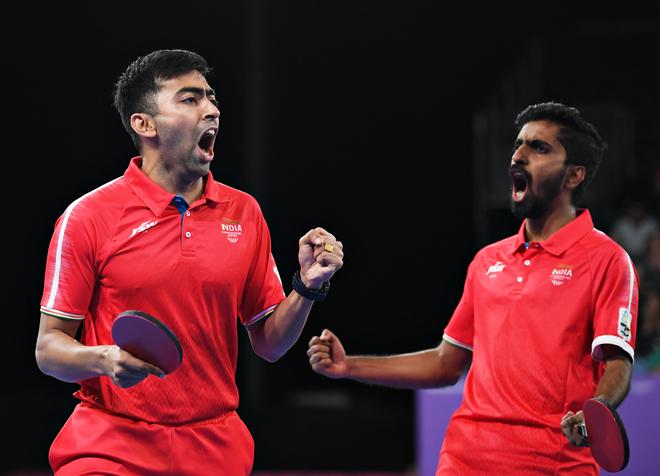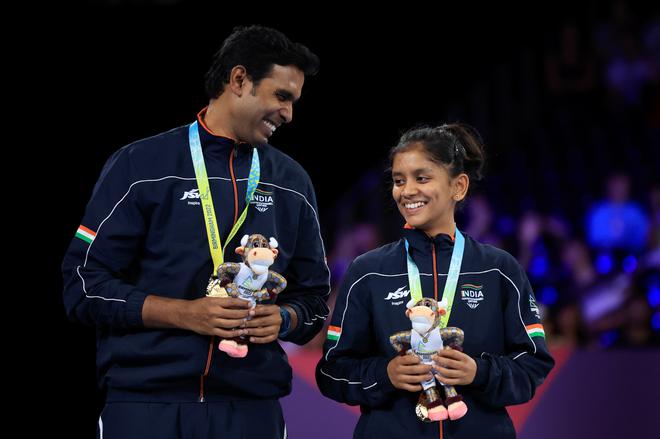

Indian table tennis is going through a rough phase. From a player’s perspective, the indefinite suspension of the elected office-bearers of the Table Tennis Federation of India and the installation of the Court-appointed Committee of Administrators has brought little hope. In the prevailing air of uncertainty, even the top players fear the worst if they raise questions.
Against such a gloomy backdrop, the team’s success at the Commonwealth Games is far bigger than the five medals suggest. It is commendable, even if it did not match the 2018 collection of eight.
Sharath Kamal, 40, stood the tallest, with three gold medals — men’s team, singles and mixed doubles (with Sreeja Akula) — and a silver in men’s doubles with G. Sathiyan. Sharath’s CWG medal tally stands at 13 from five appearances!
Sathiyan added a hard-fought singles bronze to go with the team gold and doubles silver.
Harder path
Stupendous were Sharath, Sathiyan and Harmeet Desai in regaining the team gold. They called it a tougher journey to gold than the one in 2018. Surprisingly, the makeshift mixed pair of Sharath-Sreeja made amends for the quarterfinal loss of favourite Sathiyan-Manika Batra.
Sreeja, 24, was clearly the pick among the Indian ladies. After the team’s exit in the quarterfinals, Sreeja gave it her all to reach the singles semifinals. Two close losses meant she could not make it to the podium but she won many hearts with her demeanour and display.
These high points pushed into the background the ordinary showing of Manika, winner of four medals in 2018. She could not go beyond the quarterfinals in any of her four events.
World No. 32 Sharath led the way at Birmingham. That singular show of resilience and resolve against World No. 20 Aruna Quadri of Nigeria in the semifinals changed the way the Indian TT circles looked at the team’s medal prospects.
“One of my best matches!” was the declaration from Sharath, whose international career spans almost two decades. “We knew England and Nigeria were the teams to beat. Surprisingly, England got its calculations wrong against Singapore in the semifinals and lost. That meant, if we did not beat Nigeria, we would run into England in the bronze medal match. We realised it could be gold or nothing.
“We approached Nigeria as planned, hoping to take the doubles and two singles not featuring Aruna. Harmeet and Sathiyan gave us the lead and I faced Aruna in the second singles.
“My quality of play against Aruna can be compared to the level I played against Ma Long in Tokyo, especially the way I could return his serves, was able to move my serves and make it difficult for him. I constantly was on top of my game and didn’t let him play his shots, like his big forehand.
“Still, many times when I hit a big forehand, it came back even bigger, even harder. During the match, I felt I was ahead of him but he kept coming. He kept trying new serves, different things. At one point in time, I felt like the match was going away, but I was lucky enough to close out the fourth game at 15-13 with some really big rallies.”
Harmeet’s role
Before Sathiyan came and finished the job for a resounding 3-0 victory, it was Harmeet’s role in the doubles, as well as the gold-clinching singles in the final against Singapore, that stood out.
“Harmeet was absolutely brilliant,” said his partner Sathiyan and continued, “he went for his shots and everything was top quality. He played a very big role in the doubles win, which was very important, considering that Singapore has a very strong pair. The way he played his singles in the final was absolutely stunning. We all could see he was playing world class table tennis.”
For Sharath, Harmeet was the Man-of-the-Match of the final. “The way Harmeet destroyed Singapore, first in the doubles and then in the singles, was phenomenal. He simply bulldozed Clarence Chew, who beat me, with all that he had. His level of play was super fantastic.”
On his part, Harmeet was humility personified. “In the final, I simply focused on doubles, without thinking too far ahead. Playing alongside Sathiyan becomes easy because we’ve played together from our junior days. His passive game, serve and receive are all so good that even when I am not playing well, we remain in the rally. That’s the kind of security I get from Sathiyan. We executed our plans well. Before my singles, I had watched Sharath play Clarence. I had my plan in place. I’m glad I could deliver what the team expected of me.”
The Sathiyan effect
Sathiyan’s role in winning the first (doubles) and the third (singles) matches of a tie was crucial to the team’s plans.
“Sathiyan had to play a number of matches without getting much rest in between. He has grown from strength to strength over the years. Always a team player, Sathiyan has done really well. The way he stepped up after my loss in the match against Singapore showed his resolve,” acknowledged Sharath.
Once the individual events started, Sharath and Sathiyan played up to six matches a day. “I knew it would be tough so I trained for it both mentally and physically,” revealed Sharath, “in fact, Sathiyan and Harmeet wondered how I could carry on like this and commented, ‘ Bhaiya, the way you are playing, it seems you could play another six matches today.’”
As expected, in the doubles, Sharath and Sathiyan made the final and got a chance to avenge the defeat suffered in the 2018 final to England’s Paul Drinkhall and Liam Pitchford. However, it was not to be and Indians once again suffered a 2-3 loss.
“We faltered in the decider and committed too many errors,” was the candid admission from Sharath.
Teamwork pays
Talking about the mixed doubles, Sreeja said, “I had played with Sharath anna once in 2019 before Birmingham. I was very nervous but Sharath anna gave me all the confidence.”
Sharath elaborated, “Initially, I had to talk to her a lot to make her feel comfortable. I repeatedly explained to her that we are equals, as partners, and it was important for her to give me her honest feedback. Before the final, she was in tears after her narrow loss in the singles and I had to lift her spirits. Once the final began, it was Sreeja all the way. She truly finished the match.”
The blue-ribbon event of any racquet sport is the singles and Sharath was ready for the challenges. “In the semifinal, I was ready for Drinkhall, who won the last three sets to beat Aruna in the quarterfinals. I was riding on my confidence but he came up with some unbelievable returns. I always felt in control,” said Sharath of his 4-2 victory.
Sathiyan, however, lost to Pitchford, who was keen to make amends for his twin losses to Singapore in the team semifinal.
For the bronze medal, against Drinkhall, Sathiyan tossed away a 3-0 lead to trail 8-9 in the decider before getting through. “After leading 3-0, I became too desperate. It was only after I lost my lead, I played freely and eventually won,” was the candid admission from a smiling Sathiyan.
In the final, Sharath did drop the opening game but, thereafter, made it a one-sided affair against Pitchford and the home crowd. “Somehow I knew I was playing well and never let Pitchford get ahead,” he said. “It was tough but nowhere close to the one against Aruna Quadri. With that gold, I ended my best Commonwealth Games!”







